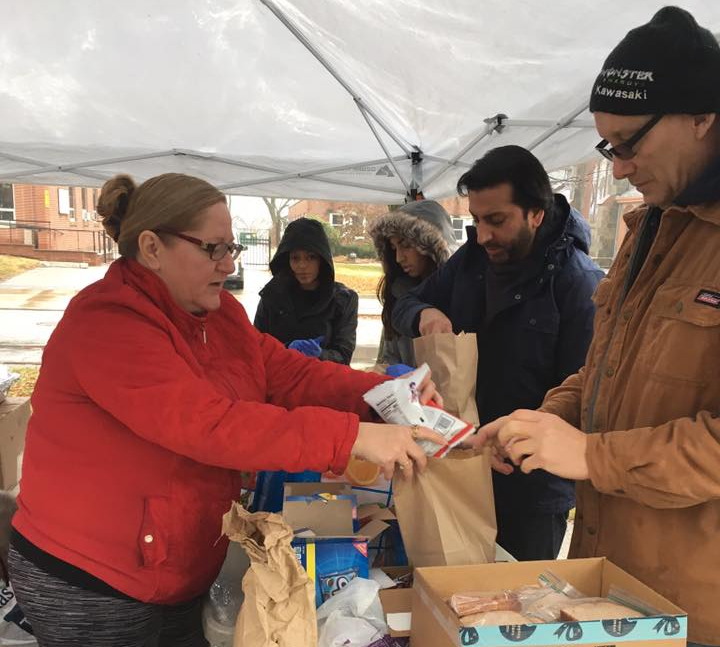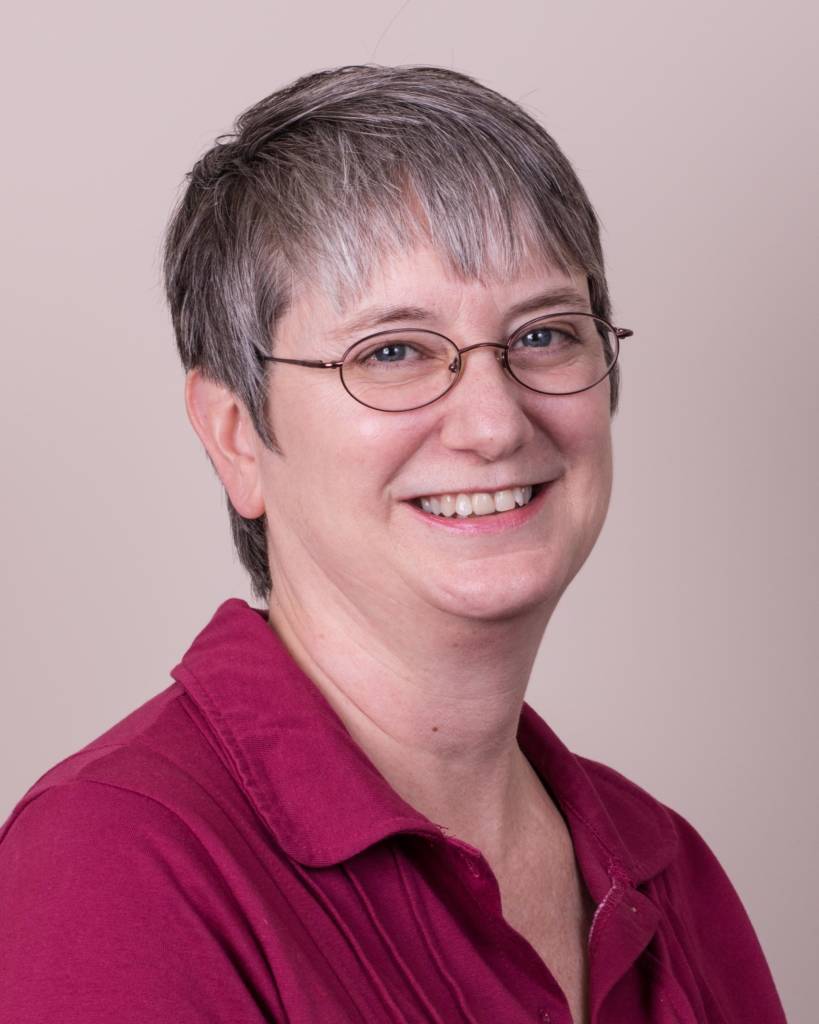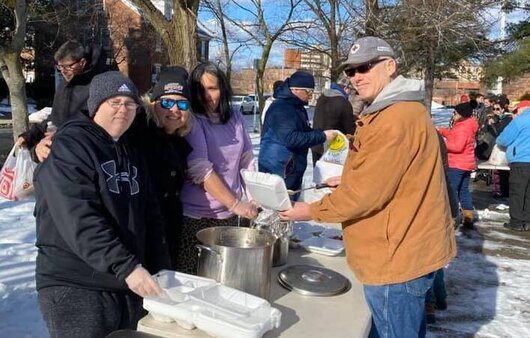Andrea Smith is on a mission. Since 2014, while holding a full-time day job, she’s led this all-volunteer organization to fight homelessness in Rhode Island with grit and determination. Stop & Shop has supported Help the Homeless RI through the Bloomin’ 4 Good and Community Bag Programs.
Tell us about Help the Homeless RI
Our mission is to serve people experiencing homelessness by operating meal sites, providing basic essentials to be distributed by outreach workers, and advocate for change in the system that serves people experiencing homelessness.
We started in 2014 and became a 501(c)(3) in 2016. I was working with two women who would collect items to bring down to Providence. This was toward the end of 2013, and it was a really cold winter. At that time, we were introduced to somebody who lived in the West Warwick community who was experiencing homelessness and knew everybody in the community in need of services and not getting any. We were providing a Sunday meal in West Warwick, but at the same time, I was curious about services for people experiencing homelessness. Who’s out there? What are they doing? And how can we help? Because I feel like you can have more of an impact if you collaborate. So, I started doing some research and created a list of people I wanted to meet and talk to.

Eventually I met Barbara Kalil (she is now Barbara Freitas and now on our board). She and her late husband were formerly homeless and she runs the Rhode Island Homeless Advocacy Project. They were in Providence doing outreach six days a week. And all they had to offer people was a bus pass to get to a shelter. And I just thought, don’t these people need stuff? You’ve got at least to have hats and gloves in the winter, and what do people do about socks and underwear? So, my journey started with a GoFundMe for socks and underwear.
Eventually I went my own way because I wanted to branch out of the immediate area. We kept our toes in West Warwick but expanded to Pawtucket and eventually to Woonsocket. We thought that we would only be able to provide meals maybe twice a month in Woonsocket. We knew the need would be huge, that there would be a lot of people. And weren’t sure what the community support would be. But the community support was just incredible. That’s where building relationships and partnerships is really important. The Woonsocket meal site was eventually taken over by our partners from the MAE Organization for the Homeless and serves anywhere from 80-150 people every Sunday.
What sets your organization apart from others in your community?
It’s important to know that we’re a small organization. One of the things that we’re known for is being nimble. We respond quickly and don’t have a bureaucracy.
Not only am I the executive director, involved in statewide coordinated outreach with other organizations, but I’m also on the front lines. And I think that’s rare. I have a presence every Sunday and Thursday, for example, in West Warwick. But being active on the ground gives you in-depth knowledge of the community and helps build relationships you can’t get otherwise.
HtHRI also has three folks on the board that have lived experience; I think that helps. And I know what it’s like. I know what it’s like to be poor because I’ve been there, too. I was a single mom. I raised a son on my own and sometimes you don’t have an extra dollar, sometimes you just don’t.
We don’t provide services; we’re more about goods. Our primary focus is to provide the most needed items, which are tents, sleeping bags, backpacks and winter gear, but we collaborate with other organizations that do provide services and supplement their services by providing goods or funds. And that’s again why our partnerships are so important. My goal is typically to connect people to a homeless service provider to provide the services and then they can come to us if there’s something that their client needs that they can’t provide.
We sometimes have funds available to assist in other ways. We’ve put folks in hotels; we’ve done security deposits; we’ve done plane tickets for folks to get home to family who would have shelter for them. Everything from toiletries to security deposits and rental assistance, just the whole gamut.
Tell us a story that clearly illustrates the good work you are doing.
We’ve initiated three meals sites in three communities. And the number of people that we have impacted is just incredible. And if we only looked at what we do at our meal sites, we average 400 meals a week. And then you need to appreciate all the relationships that are formed. At those meal sites, people are given an opportunity to serve the folks in their community. Community Service breaks down the stereotypes of people who are poor and homeless and then people want to help because they have a relationship. They look forward to serving; it’s not work. It’s, “I’m going to see my friends and I’m helping them, and it feels good.”
We’ve focused on serving meals and providing goods to the underserved communities of West Warwick, Woonsocket and Pawtucket. While we don’t do housing, the goal really is to get people housed. It’s a matter of continually advocating for them, making connections and trying to build capacity.
I think what people don’t understand is that you already have people who are experiencing homelessness living in your community.
People can get frustrated when there are plans to develop housing for the homeless in their own backyard. But I think what people don’t understand is that you already have people who are experiencing homelessness living in your community. Especially in a community that is not homeless friendly, people who are experiencing homelessness will make sure that they’re not visible.
There can be temporary solutions. For example, in 2016, there was a homeless encampment in West Warwick, and it took about a year, working with a volunteer committee, to get everyone out of there and in a stable place. But then life went on and there was nobody to address the newcomers as they came because it had been an all-volunteer temporary committee.
Now we have a dedicated working group made up of representatives from several organizations. It started as a healthy neighborhoods work group to address landlord/tenant issues. But then one of the committee members said that we can’t talk about housing and not talk about homelessness. The goal of the working group is to become a model for how other communities can address the lack of housing. And because it’s a working group, it’s not going to go away.
One of the goals last year of the work group was to get folks in hotels. HtHRI has stepped up three times to run a hotel program because the system had no immediate solution for folks who were medically compromised and families with children. It’s still a systemic problem that needs to be addressed.
What do you want people to know about your organization?
We share hope. We’re an all-volunteer organization. We have very minimal overhead; just about everything goes directly to the people in need.
And although we have an overwhelming number of volunteers who show up at our meal sites and help us on Sundays, there’s less than a handful of us that are doing the day-to-day work, which means 80% of what’s done is done by me on top of working a full-time job.
When we all work together, when we are united, we really can make a huge impact on the community.
The other thing is that all our food is cooked by volunteers, and they take that money out of their own pockets to provide the food they cook for 80-150 people. And we’ve been doing this since 2014. Their generosity just blows my mind.
I’m extremely grateful for all our volunteers, donors, churches and organizations we work with. And so many people who’ve just been so incredibly amazing. When we all work together, when we are united, we really can make a huge impact on the community.
And I’m grateful to all the people who influenced me and inspired me, like Barbara and her husband. She got me involved in the statewide outreach and opened my eyes to true outreach. That is, meeting people where they are. Sometimes those places can seem scary and dangerous until you take the time to have conversations.
How will you use the funds raised from the Stop & Shop Community Bag and Bloomin’ 4 Good programs?
Directly to purchase basic human needs for the homeless.

